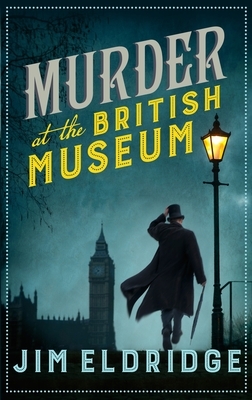
Murder at the British Museum
by Jim Eldridge
Genres: Crime, Historical Fiction, MysteryPages: 320
Series: Museum Mysteries #2
Rating:

Synopsis:1894. A well-respected academic is found dead in a gentlemen's convenience cubicle at the British Museum, the stall locked from the inside. Professor Lance Pickering had been due to give a talk promoting the museum's new 'Age of King Arthur' exhibition when he was stabbed repeatedly in the chest. Having forged a strong reputation working alongside the inimitable Inspector Abberline on the Jack the Ripper case, Daniel Wilson is called in to solve the mystery of the locked cubicle murder, and he brings his expertise and archaeologist Abigail Fenton with him.
But it isn't long before the museum becomes the site of another fatality and the pair face mounting pressure to deliver results. With enquiries compounded by persistent journalists, local vandals and a fanatical society, Wilson and Fenton face a race against time to salvage the reputation of the museum and catch a murderer desperate for revenge.
Murder at the British Museum follows on from the first book in Jim Eldridge’s series of mysteries based in museums, following the characters Daniel Wilson (retired cop, now private investigator) and Abigail Fenton (archaeologist, now also a private investigator) as they tackle another murder in a museum. There’s a lot of tension in this book between the private investigators and the police, since Daniel’s now working alongside people he knew in the force, but it isn’t just one-dimensional: Inspector Feather is friendly and helpful, and unlike in the previous book, the narrative follows the police as well part of the time, which was interesting.
Overall, I found it more engaging than the previous book, with Abigail’s character feeling a touch more consistent. It’s unfortunate that for plot reasons she had to do something pretty stupid a couple of times, but there’s a couple of interesting scenes between her and Daniel (for instance her gently telling him that he mustn’t act like she’s in danger everywhere she goes, and must accept that she’ll gauge this for herself).
It’s not a series I’m going to read for the characters, I think, but it worked better for me on that front this time.
I’ll spare you any quibbles and thoughts on the subject of Arthurian scholarship, particularly as it was all from a historical rather than literary point of view (since I mostly studied it from a literary point of view). It was good enough for fiction, though I’d have expected a bit better of Abigail than to think Malory was the originator of a lot of it (she should have pointed to the Vulgate Cycle). I did think it was an interesting motive and a good use of actual scholarly arguments to set up the reason for murder.
Rating: 3/5

This sounds like an interesting read. I do appreciate it when murder mysteries include the local police — while the cozy mystery amateur sleuth thing is fun, it can be hard to accept it every time. 🙂
In this case it slots into a time when private inquiry agents were actually around, e.g. the Pinkertons, and positions that as a draw for police officers who are for some reason dissatisfied with police work. So the main character has contacts within the police and understands their point of view and way of operating very well.